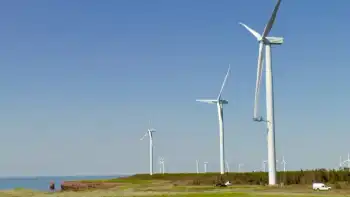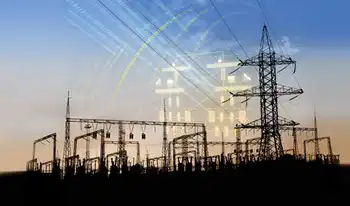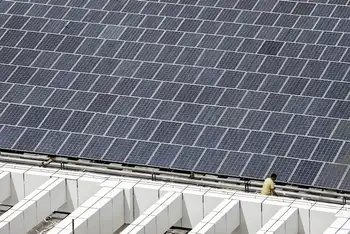U.S. approves first new nuclear plant in a generation
By Reuters
NFPA 70b Training - Electrical Maintenance
Our customized live online or in‑person group training can be delivered to your staff at your location.

- Live Online
- 12 hours Instructor-led
- Group Training Available
The NRC voted 4-1 to allow Atlanta-based Southern Co to build and operate two new nuclear power reactors at its existing Vogtle nuclear power plant in Georgia. The units will cost Southern and partners about $14 billion and enter service as soon as 2016 and 2017.
The approval was cold comfort for nuclear industry officials who have touted a "renaissance" that has failed to materialize, undercut by high costs and the cheapest natural gas prices in about a decade.
No nuclear power plants have been licensed in the United States since the partial meltdown of the reactor core of the Three Mile Island plant in Pennsylvania in 1979. After the accident, the NRC adopted more stringent safety standards, which caused construction costs for nuclear plants to skyrocket and stopped dozens of planned plants in their tracks.
Further clouding future prospects, NRC Chairman Gregory Jaczko cast an extraordinary dissenting vote, citing the Fukushima nuclear disaster in Japan in March 2011 that spurred the NRC to review whether existing and new U.S. reactors could withstand natural disasters like earthquakes and floods.
"I cannot support issuing this license as if Fukushima never happened." said Jaczko, who has close ties to congressional Democrats. "I believe it requires some type of binding commitment that the Fukushima enhancements that are currently projected and currently planned to be made would be made before the operation of the facility."
Supporters of nuclear power saw Jaczko's dissent as another sign of dysfunction at the top of the NRC, where in-fighting among members has been the subject of Congressional hearings where one Democratic commissioner called Jaczko abusive.
"The chairman just voted against the first new nuclear reactors in 30 years," said Ed Batts, a partner at law firm DLA Piper. "That's just not the way that confidence is inspired in the average American and thus does not seem like the best way for nuclear regulation."
The new plant will use AP1000 reactors built by Westinghouse Electric, a standardized design approved by the NRC in December that will be the foundation for several other proposed nuclear plants. Westinghouse is majority owned by Japanese multinational Toshiba Corp.
Thomas Fanning, Southern Co.'s chief executive Officer, called the license a "monumental accomplishment" and said the new Vogtle plants would provide cheap, reliable power to Southeast residents for years to come.
"This has been a thorough, thoughtful and complete process," Fanning said. "Recall that four other commissioners saw the same facts and voted" to issue the license.
However, Rep. Edward Markey of Massachusetts, a Democratic critic of the nuclear industry, said the agency "abdicated its duty to protect public health and safety, just to make construction faster and cheaper for the nuclear industry."
Fanning declined to say why Southern would not agree to include language in the new license to complete potential Fukushima modifications before the Vogtle reactors come online as Jaczko suggested.
"There will be issues from the Fukushima review that apply to the U.S. nuclear fleet, but they apply much more closely to the current fleet, not this newest generation of nuclear technology," Fanning said.
The Obama administration has offered Southern and its partners $8.3 billion in federal loan guarantees as an incentive. Fanning said he expects the U.S. Energy Department to finalize the loan in the second quarter of 2012.
Southern's Vogtle project is the first in a queue of permits filed by U.S. utilities, like Scana Corp. These were once expected to usher in a "renaissance" of nuclear power, which now accounts for about 20 percent of U.S. electric generation.
Interest in building new nuclear plants had risen about a decade ago when natural gas prices were soaring and experts thought the U.S. Congress would begin to place limits on emissions of carbon dioxide and other greenhouse gases.
Between the fall of 2007 and the summer of 2009, 13 companies applied for construction and operating licenses to build 25 new reactors, including units of Southern, Scana Corp, Exelon, Duke Energy, NRG Energy, Progress Energy, Dominion Resources, NextEra Energy and Energy Future Holdings.
But the case for widespread U.S. nuclear plant construction has eroded due to abundant natural gas supplies, slow electricity demand growth in a weak U.S. economy, lack of financing and uncertainty following the Fukushima disaster.
Nuclear industry officials now say they expect just five new reactors to enter service by 2020 -- Southern's two Vogtle reactors, two at Summer in South Carolina and one at Watts Bar in Tennessee, to be built by the federally owned Tennessee Valley Authority.
Earlier this week, TVA said the Watts Bar unit was behind schedule and that costs would "significantly exceed" a previous building cost estimate of $2.5 billion.
New nuclear plants are "more questionable because there are economic factors right now which favor gas-fueled power plants and the fact that the economy is only growing slowly means that nationally the need for new generation is lower than people were expecting in 2007," said Michael Golay, a professor at the Massachusetts Institute of Technology.
A 1,000-megawatt natural gas plant takes a few years to permit and build and costs up to $1 billion for the most efficient, combined-cycle model. A similar-sized nuclear reactor however could take five to 10 years to develop and build and cost more than $5 billion.
Industry experts say building interest is centered in Southeast states like Georgia, the Carolinas, Virginia, Alabama and Florida, where traditional utility regulation offers companies the best chance to make a profit on the sizable investment needed to develop new reactors.
Southern Co. stock closed at $44.68 per share, nearly unchanged from the previous day.











